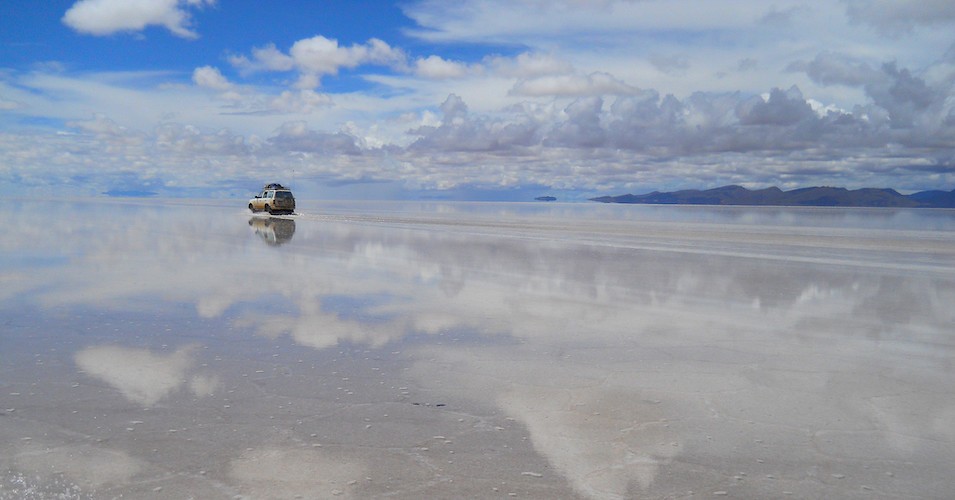Bolivian Coup Comes Less Than a Week After Morales Stopped Multinational Firm’s Lithium Deal
LATIN AMERICA AND THE CARIBBEAN, 18 Nov 2019
Eoin Higgins | Common Dreams – TRANSCEND Media Service
“Bolivia’s lithium belongs to the Bolivian people. Not to multinational corporate cabals.”

Bolivia’s Salar de Uyuni salt flats hold the largest reserves of lithium in the world. (Photo: Psyberartist/Flickr/cc)
11 Nov 2019 – The Sunday military coup in Bolivia has put in place a government which appears likely to reverse a decision by just-resigned President Evo Morales to cancel an agreement with a German company for developing lithium deposits in the Latin American country for batteries like those in electric cars.
“Bolivia’s lithium belongs to the Bolivian people,” tweeted Washington Monthly contributor David Atkins. “Not to multinational corporate cabals.”
The coup, which on Sunday resulted in Morales resigning and going into hiding, was the result of days of protests from right-wing elements angry at the leftist Morales government. Sen. Jeanine Añez, of the center-right party Democratic Unity, is currently the interim president in the unstable post-coup government in advance of elections.
Investment analyst publisher Argus urged investors to keep an eye on the developing situation and noted that gas and oil production from foreign companies in Bolivia had remained steady.
The Morales move on Nov. 4 to cancel the December 2018 agreement with Germany’s ACI Systems Alemania (ACISA) came after weeks of protests from residents of the Potosí area. The region has 50% to 70% of the world’s lithium reserves in the Salar de Uyuni salt flats.
Among other clients, ACISA provides batteries to Tesla; Tesla’s stock rose Monday after the weekend.
As Bloomberg News noted in 2018, that has set the country up to be incredibly important in the next decade:
Demand for lithium is expected to more than double by 2025. The soft, light mineral is mined mainly in Australia, Chile, and Argentina. Bolivia has plenty—9 million tons that have never been mined commercially, the second-largest amount in the world—but until now there’s been no practical way to mine and sell it.
Morales’ cancellation of the ACISA deal opened the door to either a renegotiation of the agreement with terms delivering more of the profits to the area’s population or the outright nationalization of the Bolivian lithium extraction industry.
As Telesur reported in June, the Morales government announced at the time it was “determined to industrialize Bolivia and has invested huge amounts to ensure that lithium is processed within the country to export it only in value-added form, such as in batteries.”
It’s unclear what the next steps are for the industry in a post-coup Bolivia, according to global intelligence analysis firm Stratfor:
In the longer term, continued political uncertainty will make it more difficult for Bolivia to increase its production of strategic metals like lithium or develop a value-added sector in the battery market. The poor investment climate comes at a time of expanding global opportunities in lithium-ion battery production to meet rising demand from electric vehicle manufacturing.
ACISA told German broadcaster DW last week that the company was “confident that our lithium project will be resumed after a phase of political calmness and clarification.”
On Sunday, Morales resigned.
____________________________________________________
Our work is licensed under a Creative Commons Attribution-Share Alike 3.0 License. Feel free to republish and share widely.
Go to Original – commondreams.org
Tags: Bolivia, Conflict, Coup, Evo Morales, Geopolitics, Hegemony, Imperialism, Indigenous Rights, Latin America Caribbean, Military, Politics, Power, Trump, USA, Violence, West
DISCLAIMER: The statements, views and opinions expressed in pieces republished here are solely those of the authors and do not necessarily represent those of TMS. In accordance with title 17 U.S.C. section 107, this material is distributed without profit to those who have expressed a prior interest in receiving the included information for research and educational purposes. TMS has no affiliation whatsoever with the originator of this article nor is TMS endorsed or sponsored by the originator. “GO TO ORIGINAL” links are provided as a convenience to our readers and allow for verification of authenticity. However, as originating pages are often updated by their originating host sites, the versions posted may not match the versions our readers view when clicking the “GO TO ORIGINAL” links. This site contains copyrighted material the use of which has not always been specifically authorized by the copyright owner. We are making such material available in our efforts to advance understanding of environmental, political, human rights, economic, democracy, scientific, and social justice issues, etc. We believe this constitutes a ‘fair use’ of any such copyrighted material as provided for in section 107 of the US Copyright Law. In accordance with Title 17 U.S.C. Section 107, the material on this site is distributed without profit to those who have expressed a prior interest in receiving the included information for research and educational purposes. For more information go to: http://www.law.cornell.edu/uscode/17/107.shtml. If you wish to use copyrighted material from this site for purposes of your own that go beyond ‘fair use’, you must obtain permission from the copyright owner.
Read more
Click here to go to the current weekly digest or pick another article:
LATIN AMERICA AND THE CARIBBEAN: